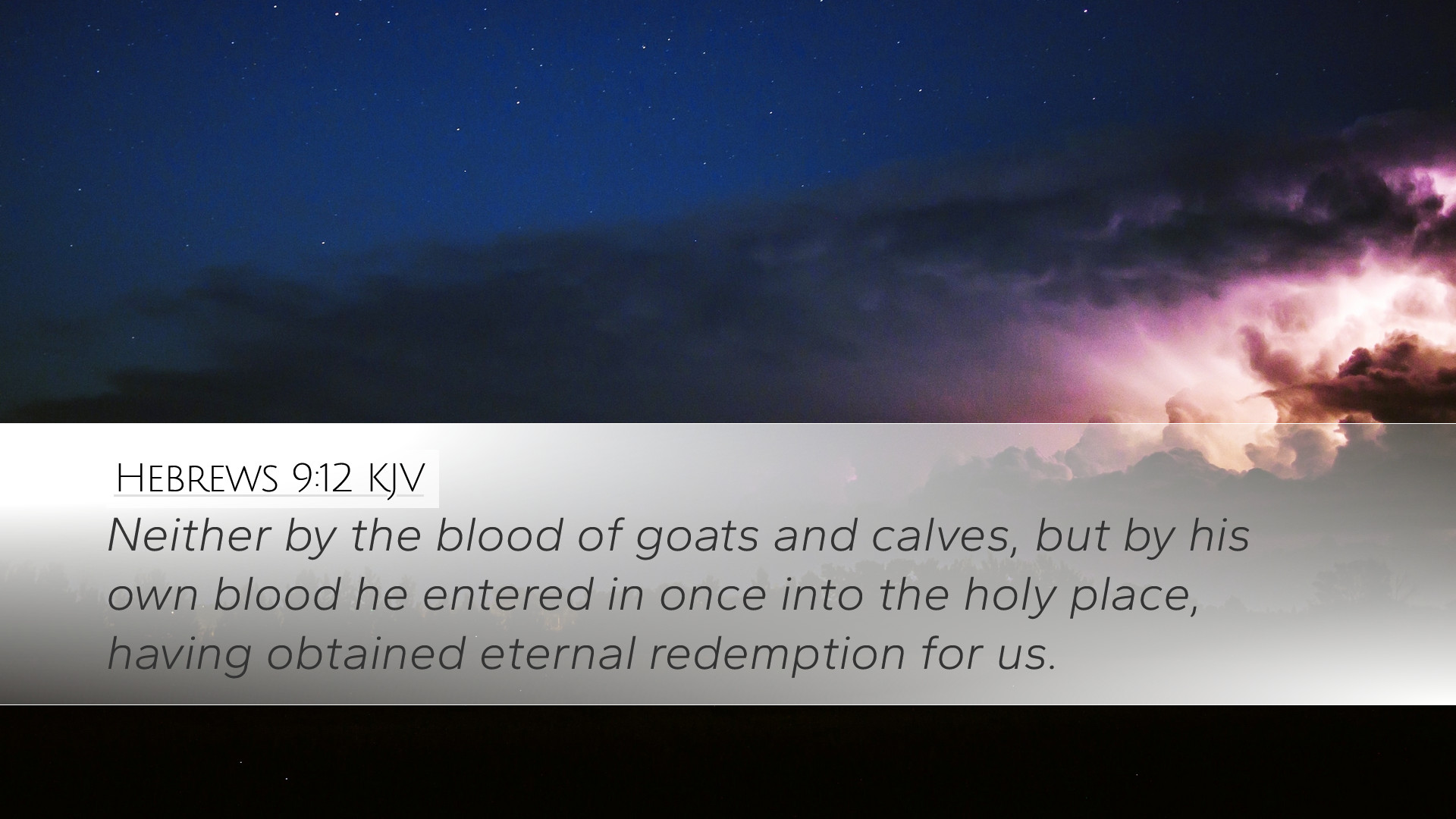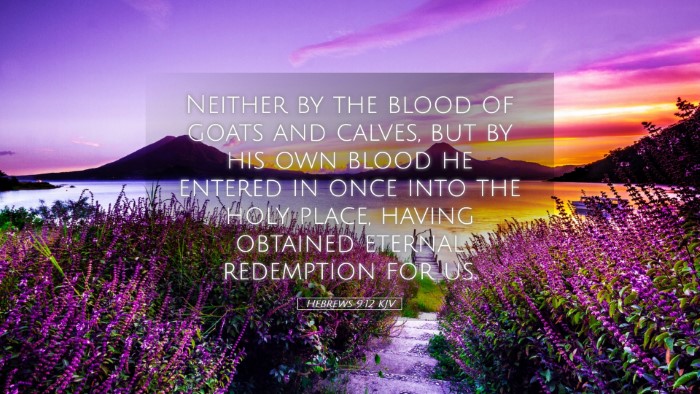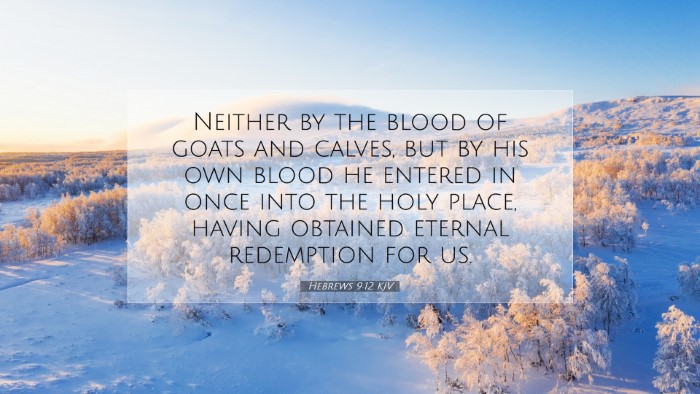Commentary on Hebrews 9:12
Verse Citation: Hebrews 9:12 - "Neither by the blood of goats and calves, but by his own blood he entered in once into the holy place, having obtained eternal redemption for us."
Introduction
The epistle to the Hebrews presents a profound theological discourse about the superiority of Christ’s sacrifices over the Levitical offerings. This particular verse encapsulates two central themes: the means of Christ's entrance into the heavenly sanctuary and the nature of the redemption He accomplished.
Analysis of Key Themes
1. The Superior Sacrifice
Matthew Henry emphasizes the stark contrast presented here. The blood of animals—specifically goats and calves—represents the Old Covenant sacraments, insufficient for true redemption. This signifies that the ritualistic sacrifices of the past could not absolve sin; rather, they served as a precursor pointing to Christ's ultimate sacrifice.
Adam Clarke echoes this sentiment, noting that the daily sacrifices were continual reminders of human sinfulness but were incapable of providing a lasting solution. In contrast, the ‘own blood’ of Christ—pure and unblemished—forms the basis for a new covenant, thus introducing a transformative understanding of redemption.
2. Entrance into the Holy Place
Albert Barnes writes richly about the significance of Christ entering ‘into the holy place.’ Under the Old Covenant, only the high priest could enter the Holy of Holies once a year, and that only after a series of ritualistic purifications. In the context of this verse, Christ’s singular entrance into the heavenly sanctuary denotes His role not only as the sacrificial lamb but as the eternal high priest, breaking the barriers of sin and enabling believers to access God's presence directly.
3. The Concept of Eternal Redemption
The concluding phrase, “having obtained eternal redemption for us,” is a profound declaration about the nature of redemption in Christ. Matthew Henry mentions that this redemption is not merely temporal or for a select few but is ‘eternal’—spanning beyond the constraints of time and offering permanence. This notion of eternal redemption contrasts sharply with the repeated sacrifices made under the law, indicating a finality to the atonement Christ achieves through His blood.
Moreover, Adam Clarke expounds on the implications of this eternal redemption, suggesting that it assures believers of their unyielding and unbreakable status before God. It signifies forgiveness that does not waver, provided through Christ’s sacrificial atonement, ensuring believers of their salvation.
Theological Implications
1. Christ as the Fulfillment of the Old Covenant
Throughout his commentary, Albert Barnes assists readers in seeing Christ not merely as a figure in a historical narrative but as the fulfillment of promises inherent in the Old Testament. Hebrews 9:12 provides evidence that the rituals of the past were shadows of the ultimate reality found in Jesus Christ. The perfect sacrifice replaces the imperfect, thus rendering the previous sacrificial system obsolete.
2. Assurance of Faith
The assurance offered through “eternal redemption” provides significant comfort to believers. This peace is emphasized by Adam Clarke, illustrating that understanding one's status before God through Christ’s actions fosters a profound sense of security and encourages believers to embrace their faith wholeheartedly without the fear of ongoing condemnation.
3. The Centrality of Christ in Worship
This verse invites believers to reflect on the nature of worship. Matthew Henry insists that true worship must be anchored in the awareness of the sacrifice that Christ made. Our worship should be filled with gratitude towards God for the accessibility afforded through Christ's blood, recognizing that it is only through Him that we can approach God in confidence.
Practical Applications
- Understanding Redemption: Pastors and theologians are called to encourage their congregations to grasp the depth of eternal redemption. Regular teachings on its implications should enrich the congregation's worship experience and deepen their relationship with God.
- Celebrating Christ’s Sacrifice: While the Old Testament sacrifices point to the need for atonement, believers are called to celebrate the ultimate sacrifice made by Christ. Holy Communion, baptism, and other church practices serve as profound reminders of this act.
- Encouragement in Trials: Adversity can draw believers closer to the reality of their secure standing before God. Through the understanding of Christ's eternal redemption, they can find solace and strength in difficult times.
Conclusion
Hebrews 9:12 stands as a cornerstone of Christian doctrine by illuminating the sufficiency of Christ's sacrifice. Insights from public domain commentaries highlight the contrast between Old and New Covenants, emphasizing the profound implications of eternal redemption secured through the blood of Christ. In understanding this verse, pastors, students, theologians, and Bible scholars are urged to proclaim the centrality of Christ in salvation and worship tirelessly, ensuring that the depth of this doctrine informs their ministry, studies, and personal faith.


